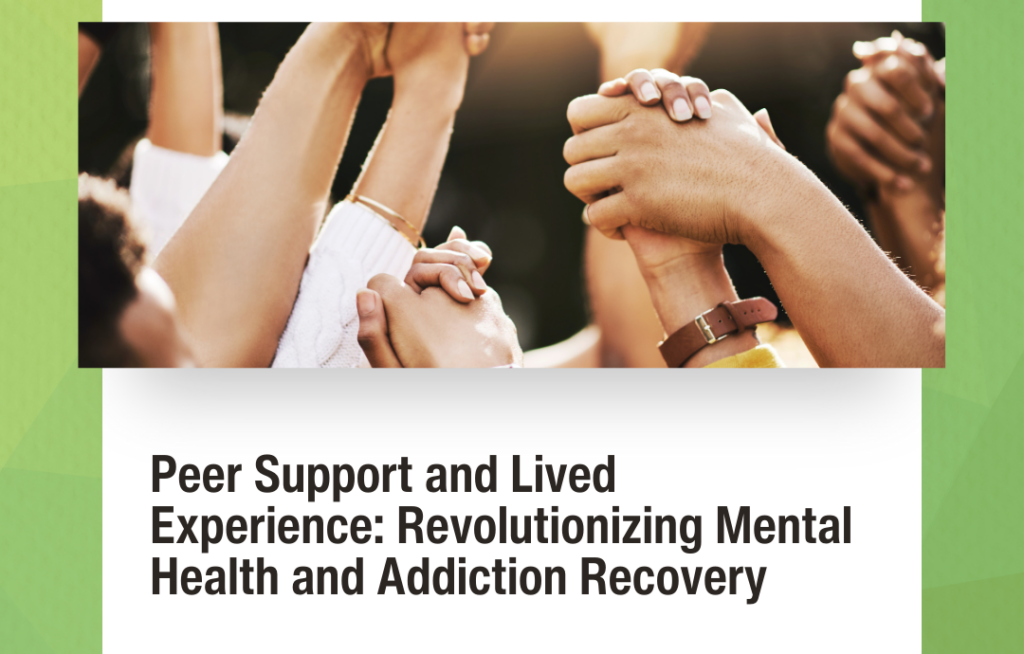Menu
Close

Peer Support and Lived Experience: Revolutionizing Mental Health and Addiction Recovery
Feb 20th, 2025
In the realm of mental health and addiction recovery, a quiet revolution is underway—one that places individuals with lived experience at the center of care and transformation. Peer support, a concept rooted in empathy, shared understanding, and mutual empowerment, is challenging traditional models of care and reshaping recovery journeys around the world.
This movement is not only changing the way we view mental health and addiction; it’s fostering resilience, breaking down stigma, and creating a global culture of community-based healing. Let’s explore the roots, impact, and growing influence of peer support and lived experience in mental health care.
What is Peer Support?
Peer support involves individuals who have experienced mental health challenges or addiction offering guidance, understanding, and encouragement to others navigating similar paths. Unlike traditional therapeutic relationships, peer support is grounded in mutual respect and shared experience, emphasizing equality and partnership rather than top-down approach.
Peer supporters provide:
- Empathy: A deep understanding of the emotional and practical challenges of recovery.
- Hope: Living proof that recovery is possible.
- Practical Guidance: Strategies, tools, and encouragement based on real-world experience.
According to the Mental Health Commission of Canada (MHCC), peer support helps foster “a sense of belonging, purpose, and empowerment” (MHCC, 2016).
The Power of Lived Experience
We see ourselves as a hub of possibility, a place where ideas and innovation converge to create Lived experience refers to the firsthand knowledge and insights gained through personal encounters with mental illness or addiction. Individuals with lived experience bring a unique perspective to recovery efforts, offering:
- Authenticity: Their stories resonate with others, breaking through feelings of isolation and hopelessness.
- Trust: Shared experiences build rapport and trust more quickly than clinical relationships alone.
- Practical Strategies: Peer supporters provide actionable advice based on what has worked for them in similar situations.
By valuing lived experience, mental health systems worldwide are moving away from top-down, clinician-driven approaches to more collaborative, person-centered care models.
Global Impact of Peer Support
North America
In Canada, programs like CMHA’s Peer College equip individuals with lived experience to become peer support workers, enabling them to empower others while strengthening their own recovery. Similarly, the U.S. Substance Abuse and Mental Health Services Administration (SAMHSA) identifies peer support as a key component of recovery-oriented care, highlighting its ability to improve engagement, reduce hospitalizations, and enhance overall well-being (SAMHSA, 2023).
Europe
In Scotland, Peer Support Workers are now a standard part of mental health services. Their involvement is credited with reducing stigma, improving treatment outcomes, and fostering a culture of inclusion (Mental Welfare Commission for Scotland, 2021).
The United Kingdom’s National Health Service (NHS) also emphasizes peer support as a cornerstone of mental health services, integrating it into community and hospital settings alike.
Australia and New Zealand
In Australia, the peer workforce has grown rapidly, with state-funded programs like Mind Australia leading the way. Peer support is recognized as an evidence-based practice, offering measurable benefits such as reduced relapse rates and improved quality of life.
New Zealand’s mental health services have embraced the Māori concept of whanaungatanga, or interconnectedness, as a foundation for peer support programs. This approach highlights the cultural adaptability of peer-led recovery initiatives.
Africa and Asia
Emerging peer support networks in countries like Kenya and India demonstrate that this model is not limited to high-income nations. Organizations such as the African Mental Health Research and Training Foundation are championing peer-based interventions to combat stigma and increase access to care in underserved regions.
Research-Backed Benefits of Peer Support
A growing body of research underscores the effectiveness of peer support in mental health and addiction recovery:
- Improved Engagement: A study published in Psychiatric Services found that peer support increased retention in mental health services by 44% (Repper & Carter, 2011).
- Reduced Hospitalization: Peer support programs in the U.S. reduced psychiatric hospitalizations by 28% and emergency room visits by 39% (Chinman et al., 2014).
- Enhanced Recovery: Peer support has been shown to boost self-esteem, resilience, and coping skills while reducing symptoms of depression and anxiety (Davidson et al., 2012).
These findings highlight the transformative potential of peer support for individuals and systems alike.
Challenges and Opportunities
Challenges
- Recognition and Training: Peer support workers often face challenges in gaining recognition and proper compensation within traditional mental health systems.
- Integration: Integrating peer support into clinical settings requires systemic shifts in mindset and practice.
- Stigma: Even within mental health services, stigma toward lived experience can undermine peer support’s effectiveness.
Opportunities
- Scaling Programs: Expanding peer support initiatives to underserved populations can bridge gaps in care.
- Innovation: Digital platforms and apps are opening new frontiers for virtual peer support.
- Cultural Adaptation: Tailoring peer support models to diverse cultural contexts ensures relevance and inclusivity.
How You Can Get Involved
At CMHA Edmonton, we are proud to champion the power of lived experience through programs like Peer College and our distress and information lines. We believe that by creating a network of support rooted in shared experiences, we can build a brighter future for mental health care in our community.
Want to learn more? Explore these resources:
- Mental Health Commission of Canada – Peer Support: www.mentalhealthcommission.ca
- Substance Abuse and Mental Health Services Administration (SAMHSA): www.samhsa.gov
- National Health Service (NHS) Peer Support Programs: www.nhs.uk
- Peer Support Canada: www.peersupportcanada.ca
Let’s make Edmonton a hub for innovation, inclusion, and hope. Join us in this global movement and help shape a new narrative for mental health recovery—one story, one connection, one life at a time.
